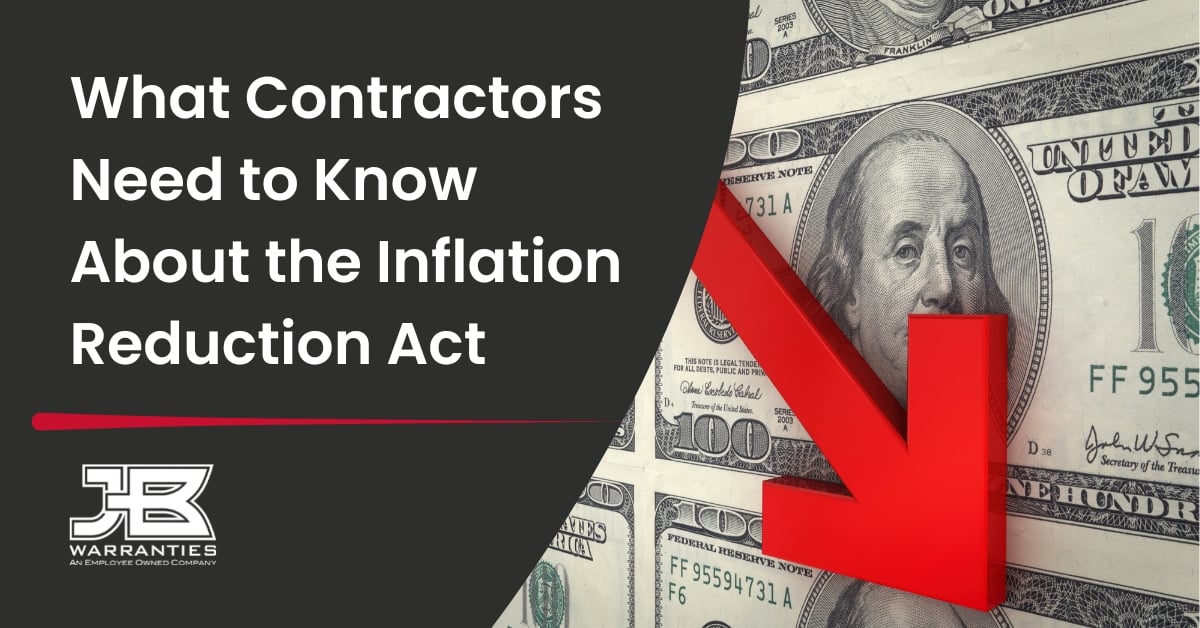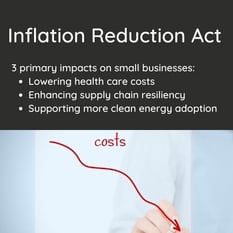
Since the Inflation Reduction Act was first signed in the summer of 2022, HVAC and plumbing contractors have been awaiting the numerous provisions included. Fast forward to the early months of 2023; several of these regulations now aim to promote energy-efficient tax incentives and new rebate programs that can benefit both HVAC and plumbing contractors and our customers.
If you’re unsure how the HVAC and plumbing industry fits into the Inflation Reduction Act or how the new energy-efficient incentives and rebates may impact your operations, keep reading.
What Exactly is the Inflation Reduction Act?
To curb the ongoing spike in inflation rates nationwide, Congress recently passed the Inflation Reduction Act (IRA), which President Biden signed into law on August 16, 2022. The IRA has three primary impacts on small businesses: lowering health care costs, enhancing supply chain resiliency, and supporting more clean energy adoption, which is crucial for the trade industry.
New IRA tax credits, rebates, and savings programs will help alleviate certain homeowner costs for those looking to make energy-efficient improvements. Such improvements include energy-efficient electrical upgrades, energy-efficient heat pump air conditioner and water heater installations, and energy-efficient appliance purchases such as electric stoves. In addition, approximately $9 billion of IRA funding will be made available for consumer home energy rebate programs, which will be allocated to states and Tribes based on population size and typical homeowner needs. As each state or Tribe is responsible for administering its own various tax credits and rebates, it’s essential for contractors and consumers to first research their operating or residing location’s IRA guidance when looking into energy-efficient improvements.

How Does the Inflation Reduction Act Impact Contractors?
While IRA tax credits and rebates aim to benefit homeowners directly, HVAC and plumbing contractors can also reap the benefits — if they approach these new changes correctly. Generally speaking, new IRA incentives will drive consumers to seek new system upgrades and replacements, resulting in a higher demand for professional trade services.
With substantial savings of up to $8,000 on energy-efficient heat pump HVAC units alone, contractors should expect consumers to opt for complete system replacements rather than repair. Though this presents significant business opportunities for professionals, it’s critical
to inform consumers about IRA incentives and prepare your operations for the potential demand ahead.
Once state guidance is established, contractors should begin communicating with their suppliers to understand which units qualify for various incentives and determine whether technicians will require further instruction on the proper installation and maintenance of energy-efficient units. Company operators may also want to tie the discussion of IRA incentives to their marketing efforts to spark the interest of potential clients, namely homeowners seeking new systems.
3 Inflation Reduction Act Tax Incentives Contractors Need to Know
There are four core incentives consumers and contractors should be aware of under the Inflation Reduction Act. By understanding each incentive below, contractors can understand various equipment and consumer qualifications to educate clients better and drive business opportunities.
1. 25D Residential Energy Efficient Property Credit
Those who offer geothermal heat pump services should be aware of the 25D tax credit, also known as the Residential Energy Efficient Property Credit. Homeowners can claim the 25D tax credit with qualifying ENERGY STAR(R) geothermal heat pumps purchased and placed into service before 2034. The 25D credit will cover 30% of costs for units placed in service before 2031, 26% for units in service before 2032, and 22% for units in service before 2034.
2. 25C Energy Efficient Home Improvement Credit
The 25C Credit, also known as the Energy Efficient Home Improvement Credit, can be claimed by homeowners who complete energy-efficient improvements to heating, cooling, and water heating units. Under the 25C credit, homeowners can claim up to 30% of system expenses, including installation and maintenance. The 25C credit is capped at $600 per year for each qualifying system or $1,200 per year total, with an expectation of natural gas or electric water heaters or heat pumps, which are capped at $2,000 per year.
3. High-Efficiency Electric Home Rebate
Of the multiple programs under the Inflation Reduction Act, the High-Efficiency Electric Home Rebate will be the top program from which homeowners and contractors can benefit. This rebate aims to allow low- to moderate-income households to electrify their homes, save on monthly utility costs, and reduce carbon emissions.
The program offers to cover 100% of electrification projects (purchase and installation costs) for low-income homeowners and up to 50% of electrification project costs for moderate-income homeowners, with a rebate max amount of $14,000. Individual components of a homeowner’s high-efficiency electrification project will each hold rebate caps, including:
- $8,000 for qualifying heat pump air conditioners and heaters
- $4,000 for necessary upgrades to electric panels to operate high-efficiency units
- $1,750 for qualifying heat pump water heaters
Remain On the Lookout for Your State’s IRA Guidance
With 2023 just starting, many states have yet to release specific guidance on the above Inflation Reduction Act tax credits and initiatives. As many states await further federal guidance on these programs, contractors should use this time to look into different energy-efficient HVAC and plumbing systems they’ll want to promote when the time is right.
Alongside present and future system installations, ensure you’re also offering a quality extended warranty service that guarantees complete customer protection and fuels long-term customer relationships. Contact JB Warranties today to learn more about our Premium Protection Plan and how our top-tier coverage can help elevate your HVAC or plumbing operations.

Tommy Cue
Vice President of Strategic Partnerships at JB Warranties






